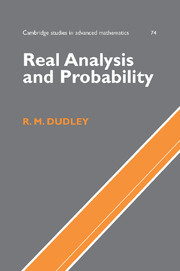Book contents
- Frontmatter
- Contents
- Preface to the Cambridge Edition
- 1 Foundations; Set Theory
- 2 General Topology
- 3 Measures
- 4 Integration
- 5 Lp Spaces; Introduction to Functional Analysis
- 6 Convex Sets and Duality of Normed Spaces
- 7 Measure, Topology, and Differentiation
- 8 Introduction to Probability Theory
- 9 Convergence of Laws and Central Limit Theorems
- 10 Conditional Expectations and Martingales
- 11 Convergence of Laws on Separable Metric Spaces
- 12 Stochastic Processes
- 13 Measurability: Borel Isomorphism and Analytic Sets
- Appendix A Axiomatic Set Theory
- Appendix B Complex Numbers, Vector Spaces, and Taylor's Theorem with Remainder
- Appendix C The Problem of Measure
- Appendix D Rearranging Sums of Nonnegative Terms
- Appendix E Pathologies of Compact Nonmetric Spaces
- Author Index
- Subject Index
- Notation Index
- References
8 - Introduction to Probability Theory
Published online by Cambridge University Press: 06 July 2010
- Frontmatter
- Contents
- Preface to the Cambridge Edition
- 1 Foundations; Set Theory
- 2 General Topology
- 3 Measures
- 4 Integration
- 5 Lp Spaces; Introduction to Functional Analysis
- 6 Convex Sets and Duality of Normed Spaces
- 7 Measure, Topology, and Differentiation
- 8 Introduction to Probability Theory
- 9 Convergence of Laws and Central Limit Theorems
- 10 Conditional Expectations and Martingales
- 11 Convergence of Laws on Separable Metric Spaces
- 12 Stochastic Processes
- 13 Measurability: Borel Isomorphism and Analytic Sets
- Appendix A Axiomatic Set Theory
- Appendix B Complex Numbers, Vector Spaces, and Taylor's Theorem with Remainder
- Appendix C The Problem of Measure
- Appendix D Rearranging Sums of Nonnegative Terms
- Appendix E Pathologies of Compact Nonmetric Spaces
- Author Index
- Subject Index
- Notation Index
- References
Summary
Probabilities are easiest to define on finite sets. For example, consider a toss of a fair coin. Here “fair” means that heads and tails are equally likely. The situation may be represented by a set with two points H and T where H= “heads” and T= “tails.” The total probability of all possible outcomes is set equal to 1. Let “P(…)” denote “the probability of.…” If two possible outcomes cannot both happen, then one assumes that their probabilities add. Thus P(H) + P(T) = 1. By assumption P(H) = P(T), so P(H) = P(T)= 1/2.
Now suppose the coin is tossed twice. There are then four possible outcomes of the two tosses: HH, HT, TH, and TT. Considering these four as equally likely, they must each have probability 1/4. Likewise, if the coin is tossed n times, we have 2n possible strings of n letters H and T, where each string has probability 1/2n.
Next let n go to infinity. Then we have all possible infinite sequences of H's and T's. Each individual sequence has probability 0, but this does not determine the probabilities of other interesting sets of possible outcomes, as it did when n was finite. To consider such sets, first let us replace H by 1 and T by 0, precede the sequence by a “binary point” (as in decimal point), and regard the sequence as a binary expansion.
Information
- Type
- Chapter
- Information
- Real Analysis and Probability , pp. 250 - 281Publisher: Cambridge University PressPrint publication year: 2002
